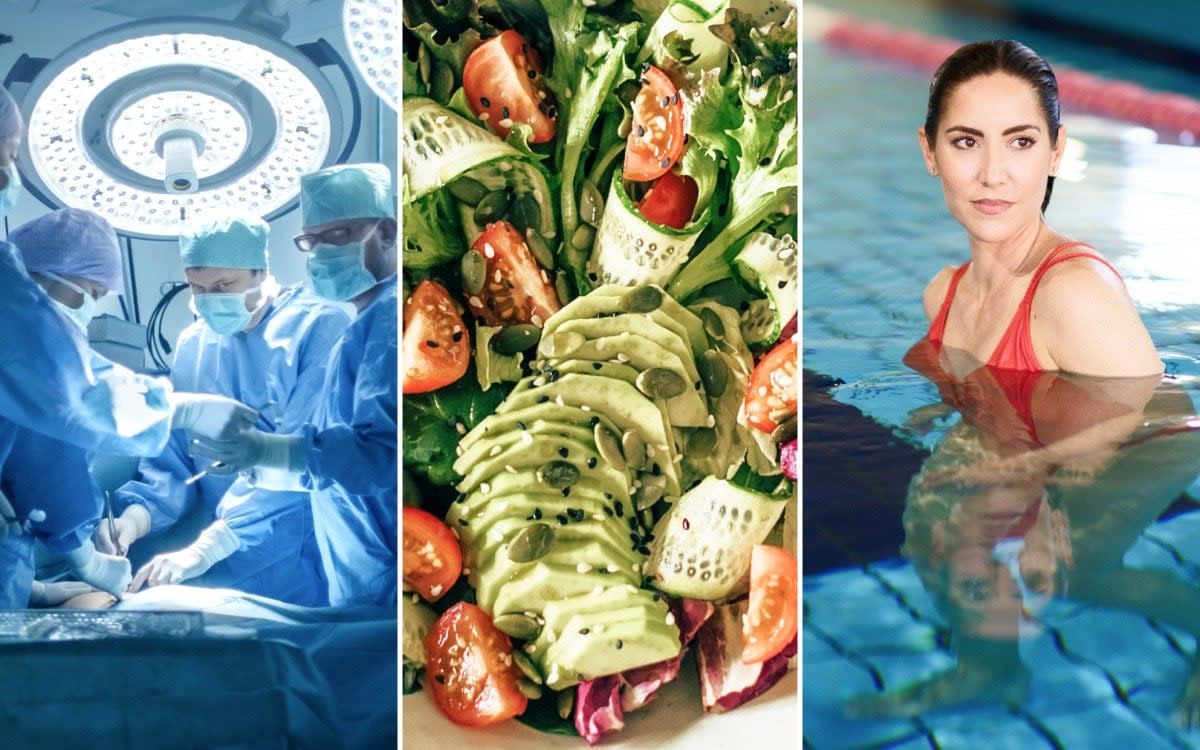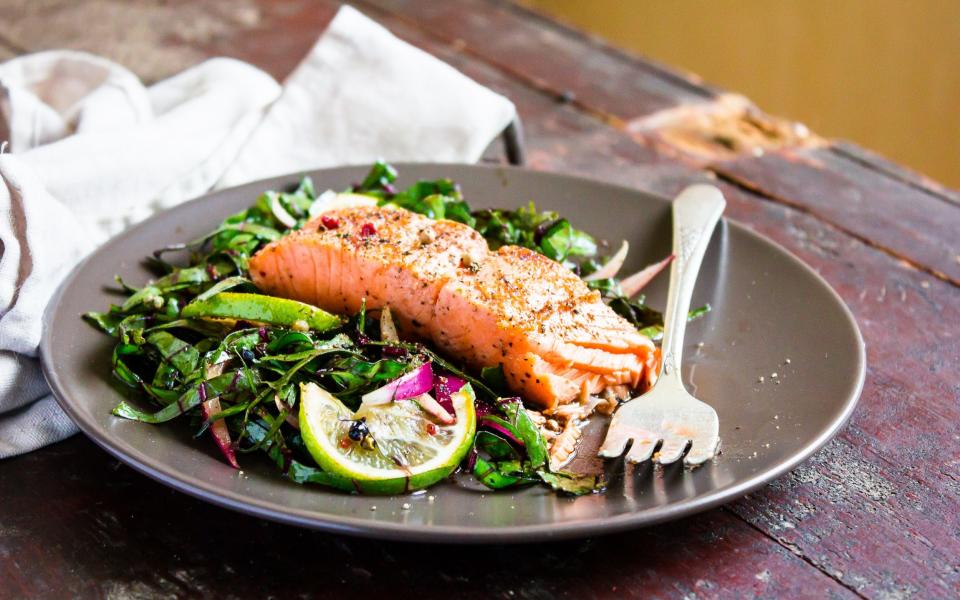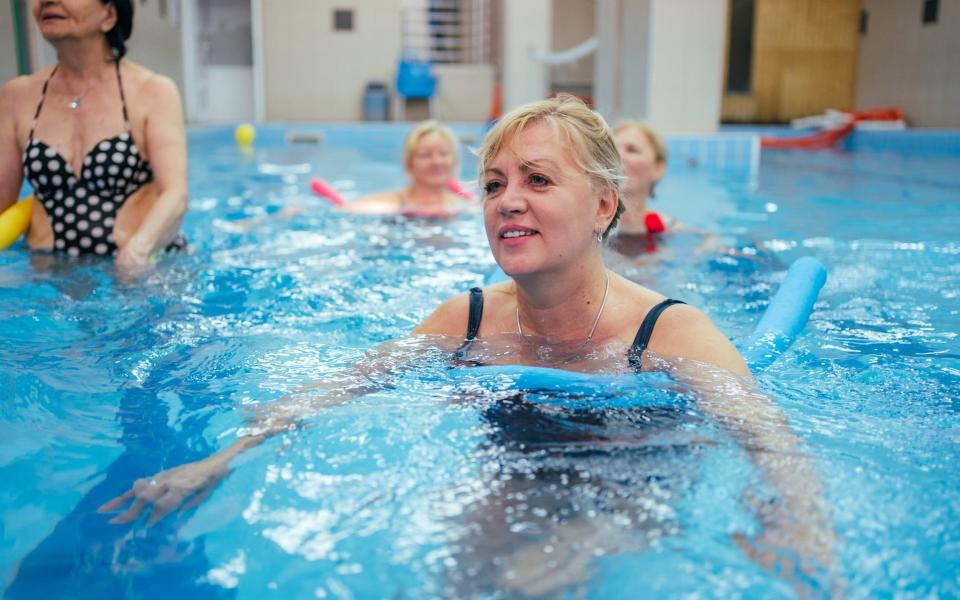Heading for a major op? How preparing your body can speed up recovery

When Heather Feast, 64, was diagnosed with breast cancer after a routine mammogram, she took the news quite calmly and went home, thinking she was coping well. “Actually, I was in shock,” admits Feast, a civil servant from Gravesend. “I thought I was in control but within 24 hours, I was on a massive rollercoaster. One minute, I was doing OK, the next minute, I felt I was falling to pieces.”
This was June 2022 and the path ahead was clearly mapped – a lumpectomy and lymph node removal in July, followed by radiotherapy. It was in the waiting period, the empty space a few weeks before surgery, when Feast was signed off from work, that she was invited to join a ‘prehabilitation programme’ which included a personal mentor, mental health support, dietary advice and an exercise programme. She accepted immediately. “When something like cancer is thrown at you, you’ve got to do everything you can to get through it,” she says.
Though provision can be patchy – a postcode lottery – a growing body of research suggests that prehabilitation may play a key role in speeding up recovery after surgery, reducing complications and improving long-term outcomes.
One study from the University of Southampton focused on bowel cancer patients who had undergone chemotherapy and were awaiting surgery. Patients offered a six-week tailored exercise programme were able to achieve pre-chemo fitness levels before surgery. After surgery, they required shorter hospital stays and experienced fewer complications and readmission rates than the control group.
Key factors
Another study of cancer patients found that fitness levels before surgery were a key factor to survival. In the wake of the pandemic, the Royal Colleges of Anaesthetists and Surgeons and the Centre for Perioperative Care have called for surgery waiting lists to be turned into preparation lists, where patients are helped to improve physical fitness, nutrition and general health.
Smoking, for example, greatly increases the risk of post-surgical complications – and evidence suggests that stopping even four weeks before surgery will improve outcomes. (The paper made the point that the period before surgery can be a powerful ‘teachable’ moment, where motivation to make healthier choices is likely to play a greater role.)

This was certainly true for Feast. “I hadn’t done any exercise classes since my 30s,” she says. “With work, family, lots of things on, it gets put way down the line.” Her prehab programme, QuestPrehab, which is widely prescribed by hospitals and GPs in Kent, offered a variety of online classes – including aerobic, strength, tai chi, boxing, pilates, yoga and mindfulness sessions.
“I was given a target of some sort of 20-minute exercise every day, but I did much more, sometimes two classes a day,” says Feast. “It gave me purpose and it was also reassuring to meet the others in the group going through the same thing.” She also changed her diet after advice from her mentor, who set nutritional targets. “I stopped eating processed foods and started making everything from scratch,” explains Feast. “I tried to increase my protein intake – plenty of salmon and chicken – to help my cells recover better.”
The programme helped in many ways. “When I finally went for my operation, it ended up being quite a long wait through the day and the breathing exercises I’d learned really helped calm me down,” she says. “After the operation, I got back to the exercise classes within 10 days. I felt so fit all through my radiotherapy.” The programme ended six months after her surgery, but Feast has continued with the diet and exercises, along with the friendships she made.
How to prepare for cancer surgery
“You wouldn’t run a marathon without training first,” says Joanne Green, who delivers prehab to cancer patients through the charity Planets, and who has herself lived with incurable neuroendocrine cancer for over 10 years. “Going through surgery knocks you sideways,” she adds. “If you eat and exercise well, you’ll probably recover better and have less side effects.”
Prehab programmes are more widely available for certain cancers – including upper GI (gastrointestinal), lung, bowel and prostate – and tend to focus on four areas: diet, exercise, mental health and behaviour modification. But if there’s nothing available for you, can you ‘prehab’ yourself?
It’s not ideal: patients come in all ages, fitness levels and with different comorbidities – diabetes, depression, high blood pressure. Some might be very overweight; others might have lost too much weight because of the cancer. Every cancer is different. However, in the absence of personalised prehab, the general guidance is 2.5 hours of moderate exercise a week, as well as additional strength training or yoga twice a week.

When it comes to diet, variety is key. “The general advice is the normal healthy plate, such as the Mediterranean diet,” says Green. “Protein is important as it’s good for repair and growth.” Cancer Research UK recommends that the amount of protein in each meal should weigh the same in grams as half your body weight in kilograms.
Aim for three meals a day, with plenty of fruit and vegetables and fish twice a week. (Those with little appetite could try eating smaller, more frequent meals.) Opt for inflammation-fighting foods too, rich in Omega 3 such as salmon, sardines, seeds and walnuts to help the body heal. (Those taking Omega 3 supplements though should consider stopping a few days before surgery as there has been some concern they can impact blood clotting.)
Addressing mental health and wellbeing is also important. Anxiety and depression is consistently associated with worse surgical outcomes. Gather support around you, call in your favours and prioritise sleep. Poor sleep in patients prior to breast surgery has been shown to be associated with increased post-operative pain and there’s growing evidence that not getting enough sleep before any surgery can increase pain sensitivity.
Stopping smoking – even within a few weeks of surgery – can improve outcomes. Smoking reduces blood flow to every organ as well as reducing lung function, raising the risk of pneumonia and infections. Limiting alcohol intake is also important. Drinking more than four units a day doubles the risk of postoperative complications.
How to prepare for joint replacement surgery
“Waiting lists for joint replacement can be very long, and the silver lining is that it gives time to make meaningful improvements which really impact recovery,” says David Vaux, physical therapies manager for Arthritis Action, whose book Stronger: How to build strength: the secret to a longer healthier life will be published by Hachette in March.
Some of the recommended prehab will be the same as prehab for any major surgery – for example, to stop smoking, limit alcohol intake and prioritise sleep. But there are key differences including building muscle and losing weight, if you need to.
“The strength of your quadriceps before a knee or hip replacement determines how well your joint will function after the operation and how quickly you recover,” says Arthritis Action’s consultant rheumatologist Dr Wendy Holden. That difference can be evident within 24 hours of the operation, according to Holden: “You’ll need strength to stand up from a chair, to get off the loo, to walk on crutches, and get around on one leg.”
A new joint – even a prosthetic one – is only as good as the muscles around it. The weaker they are, the more challenging it is to regain quality of movement. It will also be more painful. Muscle mass reduces postoperative pain by helping to absorb some of the inflammation around the joint.

How much exercise you can manage will vary for each individual. Many hospitals can refer patients to classes designed for people living with osteoarthritis, such as ESCAPE-pain. Even short daily ‘strength snacks’ like wall sits for two or three minutes a day can begin to build strength, says Vaux, or stepping down the last few stairs slowly, prolonging the lowering phase, taking each step at the count of three.
“If you’re really debilitated by pain, start [exercising] in water,” he suggests. “Go to your local pool twice a week and walk the length of the shallow end. The resistance of the water against the body is a good way to start your body moving.”
The advice is also to get to a healthy weight if you’re not already. “For every lb you carry, four times that will go on your weight-bearing joints,” says Holden. “If you’re 10kg overweight, you’ve got 40 extra kgs loaded onto your knees and hips. Just losing five to 10kg makes a big difference. Most of us can lose 1kg a week if we try really hard.”
Eating protein-rich food is good for muscle mass, but check with your GP before adopting a high protein diet, especially if you have kidney issues. “In general, there is no wonder food or devil food,” says Holden. “Eat grains, vegetables, green stuff and a wide variety to build good gut health in case you need antibiotics post-op.”
How to prepare for cardiac surgery
Not many cardio units offer prehab, and none in any specialised form. “It’s partly because we don’t know whether it works but also because of safety,” says Prof Enoch Akowuah, a leading cardiac surgeon, and one of the few to have led research on prehab. “In many cases, patients are routinely told to avoid exercise as there’s a perceived risk of increasing your symptoms and, in some conditions, sudden death as well.”
However, there is some research that points towards benefits. In a Canadian study, for example, people awaiting bypass surgery exercised twice a week – a warm-up followed by 30 minutes of aerobic activity – and spent on average one day less in hospital, as well as reporting better quality of life six months after surgery. In another study, people over 65 awaiting bypass or valve surgery who did balance and strengthening exercises were fitter and less frail after surgery than the control group.
Prof Akowuah is hoping to run a larger trial but has recently completed a trial of 180 patients who attended supervised exercise sessions twice a week for eight weeks and were also prescribed 45 minutes a day of aerobic and resistance exercise at home for five days. This included patients with severe aortic stenosis, who are usually told not to exercise. In this study, they did so with no ill-effects.
“It does make sense to get yourself fitter for what is, in effect, a physiological marathon,” says Prof Akowuah. “I think that it is probably safe to exercise. It’s a really good question to ask your surgeon when you go in with your list of questions.”
The most promising aspect of the trial was strengthening the respiratory muscles through distributing devices that patients blow into and then gradually dial up the resistance. It made the breathing muscles much stronger and this could make a key difference post-surgery, lowering the risk of chest infections. Although the devices must be prescribed and monitored by specialists, they could play a cardio role in prehab in the future.

